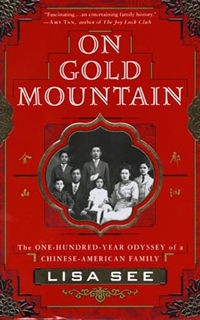On Gold Mountain
 | |
| Author | Lisa See |
|---|---|
| Language | English |
| Genre | Memoir |
| Publisher | St. Martin's Press |
Publication date | 1995 |
| Publication place | United States |
On Gold Mountain: The One-Hundred-Year Odyssey of My Chinese-American Family describes 100 years of author Lisa See's family history, providing a complex portrait of her family’s hard work, suffering, failures and successes as they moved from China to the United States. Speaking of the Chinese side of her family, See has said: "Things were so fractured and wild at home ... But the weekends with my grandparents became the real center for me ... It was the side of the family I identified more with. It was fun, romantic, solid".[1] The book has inspired both an opera,[2] and a museum exhibition.[3] It also provides helpful context for See's novel, Shanghai Girls. The time frame for Shanghai Girls is 1937-1957, corresponding to Parts IV and V of On Gold Mountain.
Overview
The memoir centers on Fong See, the author's great grandfather and his second wife, Lettice Pruett (Ticie). Fong See was one of the few who realized the dream of coming to the U.S. and finding "Gold Mountain".[4] So many others left China with the same dream but ended up with their dreams shattered. Fong See, the family patriarch, became the richest man in Chinatown and was recognized by the powers of Los Angeles proper. In China he had even more influence as "Gold Mountain See". Although Ticie was a perfect partner for Fong See in helping him develop his growing number of stores and being the proud mother of many of his children, in the end their marriage was destroyed. Keenly aware of his wealth and influence, as Fong See grew older he felt that the Chinese view of men's superiority to women was correct. In marrying a 16-year-old Chinese girl, he found what he wanted—the perfect wife in her complete subservience to her husband. Ticie's love for Fong See was so strong, that after her separation from her husband, she gradually fell apart.
Although See treats her male ancestors with detailed and objective commentary, it is the women's perspectives that seem the most powerful—for example, those of Lettice Pruett, Sissee See, Stella See, the actress Anna May Wong,[5] who has the chance to speak to the reader "From the Grave",[6] and Carolyn See, Lisa See's mother.[7]
The memoir reaches out to a broad audience because of the way See connects her family's history to that of America and China—treating the role of Chinese men who were badly mistreated in laying track for railroad expansion, the "Roaring 20's", the Great Depression, World War II, and the years after the war. On Gold Mountain develops several very important themes—the difficulty of making connections across cultural and racial divides; the painful contrast between the dream ("Gold Mountain") and reality; the challenge of keeping love alive in the context of family problems and change. As See herself writes: "History is not just about wars and dates; it's something that happens to real people. Do they rise to the occasion and challenges or do they fail? This theme is in all of my books . . ."[8]
On Gold Mountain is centered on problems Chinese men and women have faced in coming to America. In the three novels that follow (the Red Princess Mysteries), See reuses many of these elements—but shifts the focus to the difficulty Americans face in coming to and understanding China.
Notes
- ^ quoted by Mary B. W. Tabor, "Mother, Daughter, and Books of Family", New York Times, 17 August 1995
- ^ "On Gold Mountain: An Opera"
- ^ "On Gold Mountain: A Chinese American Experience", The Smithsonian Institution (2001)
- ^ Sojin Kim, "Curiously Familiar: Art and Curio Stores in Los Angeles' Chinatown", Western Folklore, 58, Winter 1999, p. 135
- ^ Lisa See, On Gold Mountain, p. 215, New York: St. Martin's Press, 1995,
- ^ See, pp. 225-230
- ^ See, pp. 318ff
- ^ Lisa See, email to L.F. Sells, 04/16/08
References
- Ginell, Richard S. "Two from L A Opera." American Record Guide, Sept/Oct 2000.
- Kim, Sojin. "Curiously Familiar: Art and Curio Stores in Los Angeles' Chinatown." Western Folklore, 58, Winter 1999, 131-147.
- See, Carolyn. Dreaming: Hard Luck and Good Times in America. Los Angeles: University of California Press, 1996.
- Tabor, Mary B. W. "Mother, Daughter and Books of Family." New York Times, 17 August 1995. Tabor emphasizes the contrast between Carolyn See's autobiography and her daughter's memoir, both published in the same year.
